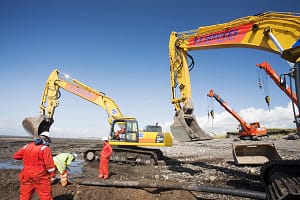The demands on the residential construction industry are ever increasing. A growing labor shortage, an increased demand for affordable housing and a drive to produce ambitious projects has propelled the modernization of the industry to improve quality and increase productivity.
Lotus Investment Group, a leading alternative property investment firm that has been operating in the Irish property market since 2013, promotes an efficient and innovative approach to project funding and advocates applying this philosophy to other sectors of the industry. The Irish housing market has experienced a supply shortage, even with the steady growth in new home construction. This shortage coupled with an increase in demand from a growing population and improved economic conditions has led to a rapid increase in the price of homes and rentals. An expansion in construction output is required to address this supply shortage in the property market. Maintaining product quality is often a concern when there is accelerated growth experienced in any sector. Preserving high standards can be difficult when timetables are shortened.
The construction sector is currently experiencing a shortage of skilled workers. An aging workforce is not being replaced at an equivalent rate by younger workers. The loss of human capital has put further constraints on the capacity of the construction industry. The labor shortage may be alleviated in the short term depending on a hard or soft Brexit, which may lead to a boost in the domestic skills base, with workers returning to Ireland from the UK. The implementation of innovative construction methods is a potential sustainable, long-term solution to labor shortages.
Increasing use of modern methods of construction
These social, financial and economic demands of the construction industry are constrained by the capacity of industry, motivating industry leaders to seek a new approach to traditional methods. Modern methods of construction or MMC, more specifically off-site construction (OSC), are increasing being used to deliver the quantity and quality demanded by the market. Off-site construction is the manufacture of a variety of components of a structure at a manufacturing facility or factory and then transporting those structures and sub-structures to the site of construction for final assembly.
Modern methods of construction could offer innovative solutions to current problems facing the Irish property market. The process of housebuilding is complex and multi-faceted. Modern methods of construction can be used to supplement the existing capabilities of the construction industry, support an alternative model for project construction and provide planners, developers and consumers with more options.
Industry experts like David Grin, chairman of Lotus Investment Group, emphasize that with an increase in output capacity, there is an increased potential for investment in the industry. With a more streamlined operation, developers will be able to reach project targets on schedule, with fewer delays. The key to meeting cost and time goals of any project is to ensure a design and build team that is genuinely experienced in delivering successful offsite constriction projects. When implementing MMC, emphasis on planning and design are essential to guarantee an efficient process and high-quality final project.
Advantages of modern methods of construction
High quantity, poor quality output has been associated with early use of off-site construction. This notion is no longer the norm in the industry. The benefits of off-site construction are many. With the responsiveness of the industry to innovation and technology, there are many potential applications yet to be explored. The transfer of on-site construction tasks to a factory setting allows modern methods of construction to provide consistent, high-quality products. By utilizing a controlled environment, MMC imposes strict standards to achieve uniform conditions to produce quality products. These standards also ensure a safer working environment for workers and less workplace injuries. Another advantage to MMC is that construction companies can apply and quickly adapt production to ensure that projects are in compliance with new and existing building regulations. In contrast, on-site construction requires strict supervision by construction foreman to ensure consistent high quality and worker safety, increasing labor demands and costs.
Huge cost and time savings are the most prominent advantages to modern construction methods. Offsite construction can reduce costs between 20% (for modular) and 40% (for volumetric). Affordable housing is a key concern for planners and consumers. The uniform construction conditions of OSC provide companies with certainty of build timelines. The indoor factory conditions are less vulnerable to weather conditions. Through the design and planning requirements of MMC delays can be anticipated and avoided. For investors like Lotus Group Investments, the MMC benefits of reduced costs and time savings are essential to maintaining project budgets and achieving project goals according to target deadlines.
MMC: Promoting sustainability in construction
The use of sustainable building methods is a key concern facing the construction industry. In the age of nZEB (near Zero Energy Buildings) there has been a growing demand for energy efficient and sustainable options. Innovative modern methods of construction have addressed these concerns by increasing the efficiency and decreasing the waste produced by traditional construction methods. An increasing limitation on resources has promoted the use of offsite construction and a pre-modular approach to building. The buildings and the construction industry are responsible for a large portion of global energy construction. Off-site construction employs more efficient methods to build and assemble structural components. Uniform production improves control over material flow, reducing waste and permitting raw materials to be recycled.
Technology can improve precision in manufacturing, reduce reliance on increasingly scarce skilled laborers, reduce waste and improve quality. The application of technology is more convenient under factory conditions providing better, more certain outcomes. Innovative technology and modern methods of construction has the potential to transform the industry and improve stakeholder confidence in the product including that of investors, manufacturers, developers, lenders, insurers, and, of course, consumers. It has become clear that with increasingly significant benefits, modern methods of construction will likely replace more traditional forms of construction across the Irish residential construction industry in the next decade.






Leave a Comment